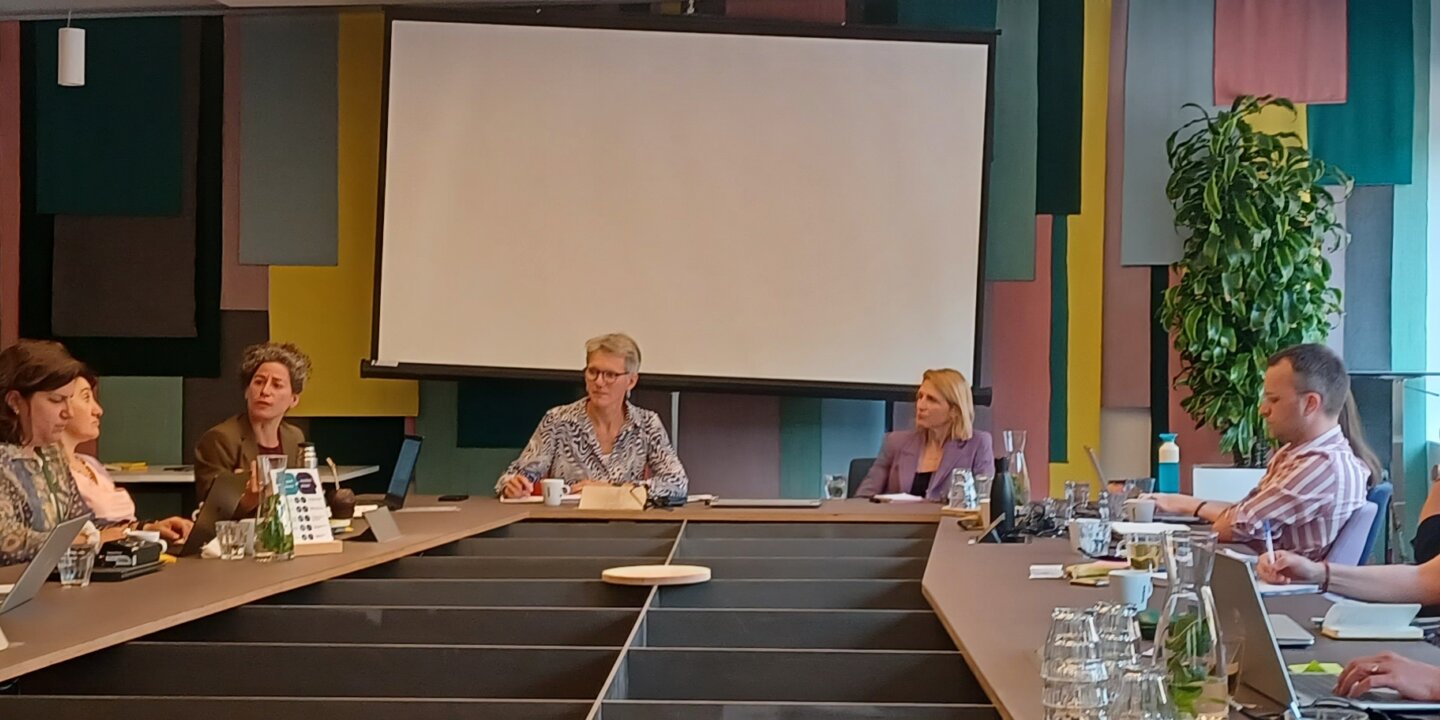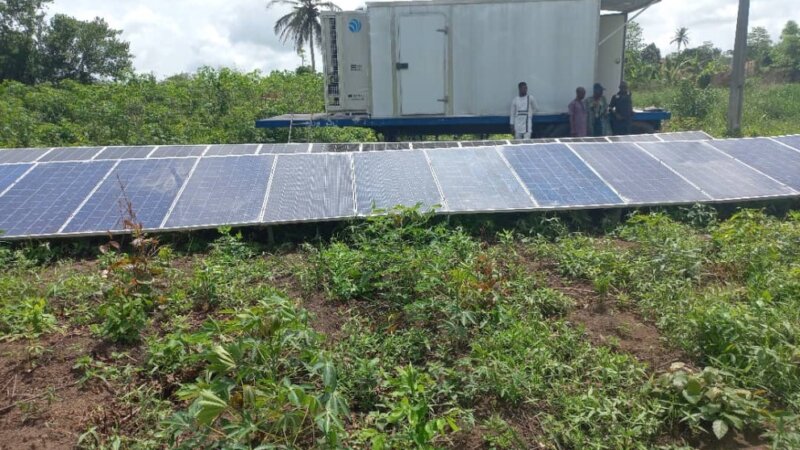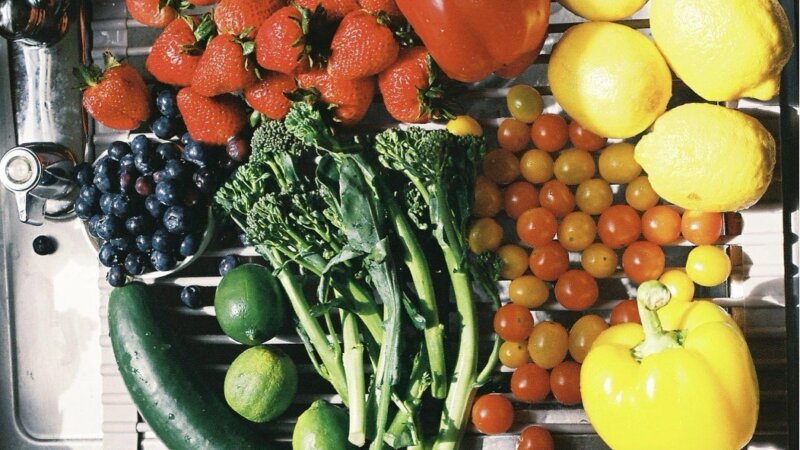Food Systems Transformation in Practice: Key Takeaways from Expert Exchange with FAO and NFP Network

On 18 June 2025, thirty experts gathered in Utrecht to explore how the Dutch contribution to food systems transformation in LMICs can be strengthened. The session included a keynote from Corinna Hawkes (FAO) on embracing complexity through systems thinking, knowing, and doing. Annie Trevenen-Jones and Kris Woltering (GAIN) shared insights from the Nourishing Food Pathways programme, focused on strengthening government-led food system policy and delivery. Paulina Bizzotto Molina (WUR) reflected on lessons from the DeSIRA Initiative, emphasizing the importance of strengthening knowledge ecosystems.
“The time is now!” said Ms Corinna Hawkes, Director Agrifood Systems and Food Safety Division at FAO, during the expert meeting with the NFP network. She reflected on the fact that amidst growing demands on food systems and limited resources, a window of opportunity has opened to implement a systemic approach—moving beyond silos, connecting interventions, and focusing on multiple outcomes.
The expert meeting was meant to jointly reflect on how to move from systems thinking to systems doing in food systems transformation. As NFP Director Mr Ivo Demmers underlined in his opening remarks, the objective was clear: improve coherence—not only in policy but especially in implementation—by sharing lessons from real-world interventions and exploring how Dutch and international approaches can inform action worldwide.
Systems thinking must lead to systems doing
There is consensus that embracing complexity is essential, but the challenge lies in putting it into practice. FAO and others are taking strategic entry points as levers to shift broader systems, such as specific value chains, seed systems, or informal markets. “No better place to go to, than where it is already done.” Examples that are taking a systems approach, highlighted by FAO, include balancing trade-offs between agricultural productivity and environmental sustainability in Sierra Leone, integrating nutrition across all strategic priorities in agricultural transformation policy in Rwanda, and using agri-tourism to strengthen rural livelihoods in Albania. The challenge is to build co-benefits, while being alert about and address trade-offs.
In Burundi, through the Farmer Field Schools programme, FAO worked with local stakeholders, including farmers and government actors, to connect them better to address systemic issues. Small groups were linked through a territorial approach. Through a joint process interconnections were examined and the initiative broadened its scope of work. Rather than focusing narrowly on agricultural production, issues such as watershed management and nutrition were now also included.
Start where you are, with what you know
Systemic change must be embedded in national contexts, not imposed externally. Countries already have actors, agendas, and institutions in place. International support should strengthen existing processes rather than create parallel ones. This includes engaging local knowledge and aligning with national priorities, as FAO is doing in multiple country partnerships.
Governance and coordination are key but complex
Transforming food systems requires joint planning, inclusive governance structures, and long-term flexibility. However, coordination takes time, funding, and often faces misaligned incentives. As several participants noted, without investing in the people and institutions who “connect the dots,” systemic change risks stalling. It is not just about the plan, it is also about the planning process and who’s involved.
In Tanzania, Mozambique, and Indonesia, GAIN’s Nourishing Food Pathways programme works collaboratively with local city governments and street vendors to drive food system transformation that is both systemic and equitable. Small and medium-sized enterprises (SMEs) play a vital role in advancing more sustainable and inclusive food system practices.
Across the African continent, 85 universities of the Regional Universities Forum for Capacity Building in Agriculture (RUFORUM), strengthened their activities in supporting the translation of research into business, co-certifying innovation facilitator training, and expanding e-learning on innovation management. In partnership with the European DeSIRA-LIFT programme and Wageningen University & Research, these efforts address key capacity gaps within the knowledge ecosystem, though long-term impact remains challenged by limited resources and differing national priorities among member institutions.
Learning Must Be Shared, Not Isolated
Systemic change requires peer learning, co-creating knowledge, feedback loops, and systems data that flows back to communities and decision-makers. Municipal learning networks in Brazil, co-created training in Rwanda, and open data initiatives like IDH’s support for supply chain transparency are examples of how learning and feedback loops can support systems transformation. Real learning happens when it is embedded in governance and backed by open knowledge ecosystems.
In Rwanda, it became clear that ministries, particularly the Ministry of Agriculture, were initially focused working in their traditional sectoral boundaries. To address this, a policy learning programme was developed with national stakeholders to build shared understanding of why cross-sector collaboration is essential for food systems transformation. The programme helped ministries grasp how their actions in the food system impact and are interconnected with other systems and outcomes, such as nutrition, trade, and environmental policy.
Systemic challenges: turning dilemmas into opportunities
The discussion with experts from various universities, development organisations and the private sector revealed several crucial challenges:
⏳ Coordination takes time. How do we encourage cooperation, while monitoring the risk of too much talking and too little acting? It is recommended to make sure there are sufficient incentives and resources (time/funding) for the connectors.
💰 Funding for food systems transitions is of key importance. Domestic budget alignment, reform of harmful subsidies and creative and flexible financing mechanisms are important building blocks.
🔍 Measurement of food systems transitions is essential for strategic decision making. The importance of monitoring mechanisms such as the Food Systems Countdown Initiative is recognised. We must assess not only the end results, but also changes in governance, capacity for collaboration and systemic integration. In doing so it is important to gain evidence of trade-offs too, to show where improving one outcome might negatively affect another.
🧩 Implementation often falls between the cracks. The “missing middle layer”, local actors, information services, SMEs, needs targeted support and recognition as key implementers of the system. Domestic and global private sector are necessary to implement the changes, supported by benchmarking instruments that encourage corporate social responsibility.
🧭 Non-financial incentives are more difficult to structure, but are crucially important. These include political will, institutional incentives and cultural shifts in power and ownership.
Where to go from here
FAO has publish ‘Transforming Food and Agriculture through a Systems Approach’ that aims to clarify what a systems approach involves in practice across food systems. It explains what a systems approach means, why it matters and how to adopt it, including examples from across regions and sectors to inspire uptake of systems-based practices.
Meanwhile, organisations in the Dutch and global networks are already acting. From systems-informed business support models to policy-focused multi-stakeholder platforms, the shift from silos to systems is happening. But it must be nurtured and accelerated.
As one participant said: “Recognising that a systems approach is happening is not enough. We need to see where the assets are, and what’s still missing.”
Final reflection: keep doing, together
This meeting was not a conclusion but a stepping stone—an opportunity to align, reflect, and identify opportunities to move forward with greater coherence. Food systems transformation isn’t just a theory. It is already being implemented, in pieces, across the globe. The task now is to connect those pieces, build shared capacity, and support the people and institutions making it happen. The upcoming UNFSS+4 Stocktake in Addis Ababa will be a critical milestone to assess progress and explore ways to accelerate implementation.
Authors

Ruth van de Velde
Partnership Builder

Nicole Metz
Senior Knowledge Broker - Netherlands Food Partnership



